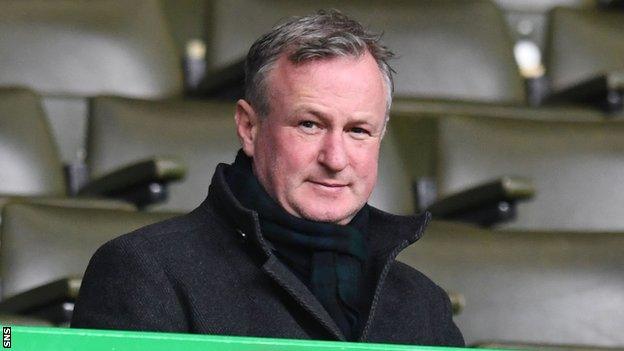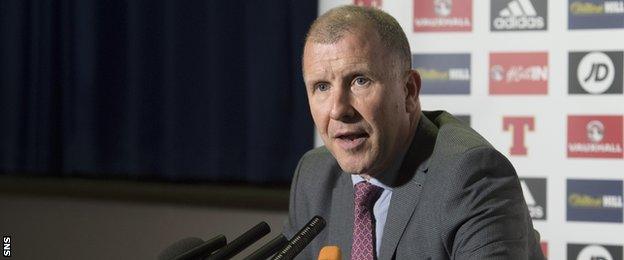Michael O'Neill: Money talks as Northern Ireland boss snubs Scotland
- Published

Michael O'Neill frequently watches matches in Scotland, but he will not be taking charge of the national team
On Saturday, 13 January, Michael O'Neill made his way from his home in Edinburgh to Lancashire to take in a League Two game between Morecambe and Stevenage, a match between two mid-to-bottom-of-the-table sides in the fourth tier of English football.
The centre of the football universe it was not. But, to O'Neill, it was important to be there. Morecambe had two players from Northern Ireland in their starting line-up, a 23-year-old defender and a 28-year-old striker. Stevenage also had two players O'Neill was keen to see, the pair of them just 21. The game ended 1-1. The crowd at the Globe Arena was 1,268.
On his way south, a voice back in Scotland who was keen on O'Neill becoming the new national team manager suggested, cheekily, that he should take in Sunday's Liverpool v Manchester City game, to run the rule over Andy Robertson, a player he would surely be working with just as soon as he agreed terms with Stewart Regan, the chief executive of the Scottish Football Association.
From O'Neill, there was no response. Privately, though, he was readying himself for a chat with the Scottish FA.
He had done his research on the players he might have if he became Scotland manager. He looked at the age profiles of the established names and the ones who might break through. He had a database of information about what he might inherit. Before he even sat down for his three-and-a-half-hour chat with Regan last Thursday, O'Neill had his ducks in a row in terms of the football side of things. His natural inclination towards preparation and attention to detail demanded it.
O'Neill had been the SFA's preferred candidate right from the start, not that they wanted people to know. The interest was leaked to the press just as soon as Regan asked the Irish Football Association's permission to speak to him. The SFA believes the leak came from Belfast, but there is no doubt it made life difficult for Regan. Time and again he has been carpeted for making it known that O'Neill was number one choice. He never did.
His admiration of O'Neill was understandable. Early in his reign in Northern Ireland, while he was rebuilding the team amid horrendous failure, O'Neill suffered the ignominy of a 6-0 loss to the Netherlands in a friendly, followed - more mortifyingly - by a loss to Luxembourg in a qualifier. From that lowly stock - world number 129 - O'Neill transformed things and made his country a top-30 side.
By taking Northern Ireland from fifth seed in their qualification pool for Euro 2016 to group winners and automatic qualification, he announced himself as a manager of substance. The success also gave the IFA £9m in revenues, some of which they have used to put a huge offer to him to stay.
He almost repeated the qualification trick when getting Northern Ireland to the play-offs for the World Cup. His team contained a sprinkling of Premier League players, a core of men chosen from the Championship, a couple from the Scottish Premiership with the rest of the squad padded out with lower-league players in England and some more from Scotland.
They were drawn against Switzerland, who were ranked 11th in the world at the time. Over two legs, Northern Ireland only lost out to a wretched penalty decision. The referee who awarded it has since admitted his error and apologised.
In making a little go an awfully long way, O'Neill looked ideal for Scotland.
The SFA quickly made him its number one choice and set about trying to put together an offer that might get him. That task was made harder - and as it turned out, impossible - by the IFA's decisive move. On top of the two years O'Neill had to serve on his existing contract it added another four years, making a total of six. And it shot his salary up to somewhere approaching the eye-watering figure of £800,000 a year.

Back to the drawing board: Regan must now turn to other candidates
Regan had his hands full to compete with that. There was resistance within the association to them even trying that hard. The chief executive had to fight, and win, a few battles in order to get to the point whereby his board would agree to pay £500,000 in compensation to release O'Neill from his contract and about £600,000 in salary for four years. On top of that there were other incentives in the event of Scotland qualifying for a major championship.
It was the biggest offer ever made to a prospective Scotland manager.
O'Neill knew this offer was coming. It had been the talk of the media for weeks, if not months. He was surprised it took Regan so long to contact him - he was, perhaps, unaware of the hoops Regan had to jump through first - but he was open-minded to the idea.
He could see the appeal of the Scotland job. Lots more players than Northern Ireland, lots of players playing at a higher level, lots of younger players coming through. He greatly valued what he had with Northern Ireland but knew that repeating the success he had previously was only going to get harder as some of his go-to men retired from the international game.
He was prepared to listen to Scotland, but never said one way or another whether he was going to accept the offer. He was genuinely torn.
Michael O'Neill hints at Northern Ireland stay
There were a number of barriers that proved insurmountable to him. The financial disparity between what he had on the table from the IFA and what the SFA was offering was significant. As good as the SFA offer was - and as hard as Regan tried in putting it together - he was being asked to accept a job that involved taking a sizeable pay cut.
If he was Scottish and was being asked to take over Scotland there would have been an emotional tug, but that didn't apply here. One of his circle, advising against him accepting Scotland's offer, put forward a scenario. "If you were a Scot and you were managing Scotland, would you take a huge drop in salary and less years on your contract in order to manage, say, Wales?"
That was the pivotal issue in all of this. There were others, though.
Having lived in Scotland - and reared his two daughters in Edinburgh - O'Neill knew as much as anyone about Scotland's desperation to qualify for a major championship after a gap of 20 years. He was told he would become a hero if he was the man who finally took the country to the promised land. He was also aware of the grief that would come his way if he faltered.
With Northern Ireland, he was established and loved unconditionally. With Scotland, he would be on trial. He wasn't sure about the scrutiny in a country that lives and breathes football.
On Monday the news came that he was turning down Regan's offer.
Whether he has made the right decision is a question that can only be answered in time, but the reality is Northern Ireland's already thin playing resources are getting thinner and the prospect of O'Neill getting them back in the hunt for a European Championship or a World Cup again are long odds-against. He has surprised everybody in the past, of course, but you have to wonder if O'Neill will come to regret his football decision if not his financial one.
As the news broke, the guns were trained on Regan for supposedly delaying then botching the negotiations, for putting all his eggs in the one basket only to be covered in yolk once his chosen man had said no.
Regan did his best, but his best wasn't good enough to match Northern Ireland's largesse. It was a sore one for him, but Regan wouldn't be the first, and won't be the last chief executive to have his preferred choice turn him down. It happens in football. It happens all the time.
Regan needs to start searching again with the flak now flying around his ears. At the outset, the SFA drew up a long list of candidates, whittled it down to a shortlist from where O'Neill emerged.
They're back at the list phase. There's no deadline. Their only word on the matter is that the process will happen as soon as possible. The speculation, as well as the criticism, will carry on for a while yet.